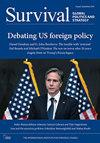IF 1.9
3区 社会学
Q2 INTERNATIONAL RELATIONS
引用次数: 0
摘要
其成员国将不得不管理几个系统性问题——债务堆积、房地产泡沫破裂、人口迅速老龄化、零covid政策——并制定可行的新经济发展模式。本文章由计算机程序翻译,如有差异,请以英文原文为准。
The Economic Consequences of Xi Jinping
Abstract In the aftermath of the 20th National Congress of the Chinese Communist Party, Xi Jinping’s principal focus will be on state and national security, while an entirely new economic- and financial-policy team, with little experience, will take charge of China’s troubled economy. Its members will have to manage several systemic problems – a debt mountain, a property bust, a rapidly ageing population, zero-COVID policies – and develop a viable new economic-development model. This would be a demanding agenda anywhere, but Xi’s China has to tackle it guided by an ever more devoutly Leninist approach to economic management, industrial policy and governance, at a time when China faces the most hostile external environment it has known since Mao Zedong, as exemplified by foreign decoupling. Although Xi’s China is capable of important accomplishments in science and technology, and of flexing its diplomatic and military muscles in defence of its interests, China’s politics may be much less capable of fixing the country’s systemic economic and financial weaknesses. The consequences of Xi Jinping’s economic programme, including an emphasis on self-reliance, promise to extend beyond China’s borders to foreign actors and countries that once benefited from its economic rise.
求助全文
通过发布文献求助,成功后即可免费获取论文全文。
去求助
来源期刊

Survival
Multiple-
CiteScore
2.10
自引率
16.70%
发文量
88
期刊介绍:
Survival, the Institute"s bi-monthly journal, is a leading forum for analysis and debate of international and strategic affairs. With a diverse range of authors, thoughtful reviews and review essays, Survival is scholarly in depth while vivid, well-written and policy-relevant in approach. Shaped by its editors to be both timely and forward-thinking, the journal encourages writers to challenge conventional wisdom and bring fresh, often controversial, perspectives to bear on the strategic issues of the moment. Survival is essential reading for practitioners, analysts, teachers and followers of international affairs. Each issue also contains Book Reviews of the most important recent publications on international politics and security.
 求助内容:
求助内容: 应助结果提醒方式:
应助结果提醒方式:


